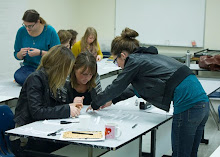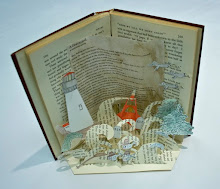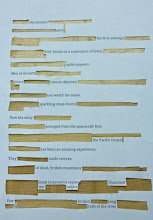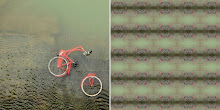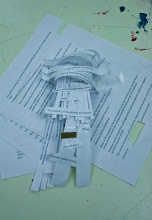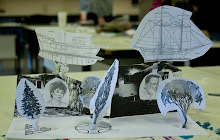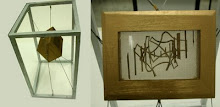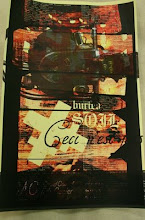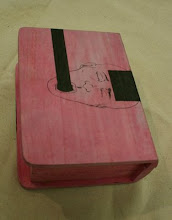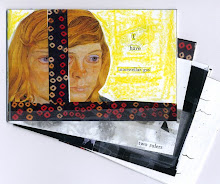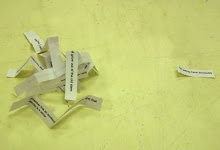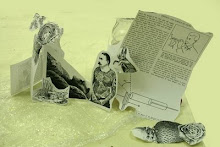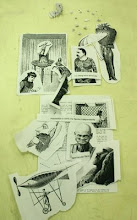VVP: Art 434 & Engl. 410
- Dan Callis and Chris Davidson
- Website for Vision Voice and Practice: An Interdisciplinary Course in Art and Creative Writing
Wednesday, April 29, 2009
Practice, Craft
Here's an article discussing, essentially, the third part of our course, practice, that activity we use to hone our craft. Let's hear it for those who labor!
Thursday, April 23, 2009
The Pleasure of Close Reading
Chapter 5 of Eagleton's How to Read a Poem closely examines a series of verse excerpts in order to define and demonstrate concepts like the texture of a poem, its tone and pitch, and its ambiguous nature. In a recent column in Slate, Robert Pinsky does the same thing with poems by Edward Thomas and Gerard Manley Hopkins. You can read it here.
Saturday, April 11, 2009
Student Work
A Mind Full
Contemplation and consumption seem to
hit home in the nineteenth year of the
omnibus. With concentration I focused
on the morsels that I consumed
without hesitation. I avoided frustration
and I considered the completion of the omnibus
that had taken nineteen years to reach fruition.
Now, raw is the "tion" of my tongue invalidating
and abandoning the "ing" ending.
- Allison Castellano
~
Costco Can Turn You Into An Obsessive Bitter Overweight Spinster
Alice once told me that she had two vices:
men and Cheez-Its.
I didn't believe her until
she finished a three-pound Costco box
in two days after her boyfriend
left her for a girl on the subway
reading Hemingway.
I told her she deserved better.
She finished another box
and emptied her apartment.
- Shirly Tagayuna
~
Stuck
An empty page stares
Back at me as I labor to get the inside out
My pen held in a cracked hand
Replete with dusty white rivers
Because the air is dry and
Words feel dry.
Much to say but how to convey
A life of hard lessons
The depth of questions
And joy in the day to day?
- Michelle Kohout
~
Morning
traps itself. Sunlight and fog,
dream and arpeggio waking-thought, before
movement, before time are things to be sought.
- Matt Gundlach
Contemplation and consumption seem to
hit home in the nineteenth year of the
omnibus. With concentration I focused
on the morsels that I consumed
without hesitation. I avoided frustration
and I considered the completion of the omnibus
that had taken nineteen years to reach fruition.
Now, raw is the "tion" of my tongue invalidating
and abandoning the "ing" ending.
- Allison Castellano
~
Costco Can Turn You Into An Obsessive Bitter Overweight Spinster
Alice once told me that she had two vices:
men and Cheez-Its.
I didn't believe her until
she finished a three-pound Costco box
in two days after her boyfriend
left her for a girl on the subway
reading Hemingway.
I told her she deserved better.
She finished another box
and emptied her apartment.
- Shirly Tagayuna
~
Stuck
An empty page stares
Back at me as I labor to get the inside out
My pen held in a cracked hand
Replete with dusty white rivers
Because the air is dry and
Words feel dry.
Much to say but how to convey
A life of hard lessons
The depth of questions
And joy in the day to day?
- Michelle Kohout
~
Morning
traps itself. Sunlight and fog,
dream and arpeggio waking-thought, before
movement, before time are things to be sought.
- Matt Gundlach
Friday, April 10, 2009
Losing Your Bearings

This past Tuesday, for his contribution to the song-of-the-day part of the class, Kevin showed us the video for the Alphabeat song "Fascination." Why? Because, he said, he liked the song. Good enough for me. The song contained all one can hope for in pop music: it was catchy, light, joyous beyond what the material would seem to warrant. This is what makes songs like this so much fun.
After Kevin played us the video, I played a couple of songs by the Beach Boys that were recorded during the rise and collapse of the SMiLE album. You can read the story here. In the first, unfinished version of "Wind Chimes" that we listened to, we could hear some of composer Brian Wilson's optimism, which came from enjoying an already successful career, a record company backing him after a hugely popular (and pretty strange, if you think about it) single, a rock press repeatedly proclaiming his genius, and a band waiting for its next recordings to inspire an even greater wave of fan adoration. This earlier version of "Wind Chimes," like "Good Vibrations," embodies a proto-hippie utopianism: The wind chimes and the wind and me, man, we're all part of the cosmic order. Heavy.
So when, after recording delays and interpersonal squabbling and record company hostility and nascent fan desertion and the press revoking its endorsement, and after one more Brian Wilson psychic collapse, the Beach Boys re-made "Wind Chimes," in this version, which we also listened to in class, the sound has changed: We now hear a person--and group of people--losing their bearings. It is for me the more interesting of the two recordings. There's more going on musically (listen to the amazing acapella ending!) and thematically: the song predicts and evokes the sinister underside of all that hippie utopianism, creepily expressed later in the decade in the movie Gimme Shelter. By losing his way, Brian Wilson temporarily gained a vision.
We'll read later in the semester Flannery O'Connor's persuasive claim that only by keeping your bearings can you truly see. And maybe this is the truer case for Brian Wilson, as well. Music, and not the stuff that came with it, was what rooted him. He had been singing with his brothers (future bandmates) and sister since they were children, with Mom and Dad at the piano, working out the harmonies of hymns and standards. After his world fell apart, he could still sing with his brothers (and cousin, also in the band). That's what makes this song more substantially hopeful than the earlier version: It charts in its trajectory a means of respite. After the unsettling harmonies and insistent organ and sound effects drop away, what's left is the sound of voices working, harmonically, together. For Wilson, after the darkness, he still could make something, and make it well, and within a community who loved making this thing with him.
Wednesday, April 8, 2009
Two Poems
Last night, Heather McHugh gave a reading (with August Kleinzahler) at LACMA, and it was about as scenic a venue as you could hope for. The poets were framed by a huge black painting (or what I took to be a painting) and were flanked by Richard Serra's immense sculptures Sequence and Band. McHugh's introductions were like little lessons in perception, and two poems in particular stood out: "Etymological Dirge" and "With wine and being lost, with," a Paul Celan poem translated by McHugh and Nikolai Popov. I couldn't find this one online, but it's worth seeking out. You can read another of their Celan translations here.
The idea for the reading was inspired: Speaking the well-considered word into a visual Eden. But the acoustics were terrible. The sofest shuffling of feet reverberated throughout the place and seemed to gain volume and momentum, like a roll of thunder. Kleinzahler's habits of delivery made hearing his work particularly difficult, and McHugh's was transmitted more effectively via her positioning of the mic (she stood away from it) and her mild projection, but I still missed a fair amount of what she said. In other words, when putting together future readings, the LACMA people and co-organizer USC might might look for another room on that indulgent, resplendent campus. Gregorian chanters, on the other hand, should be booked immediately.
The idea for the reading was inspired: Speaking the well-considered word into a visual Eden. But the acoustics were terrible. The sofest shuffling of feet reverberated throughout the place and seemed to gain volume and momentum, like a roll of thunder. Kleinzahler's habits of delivery made hearing his work particularly difficult, and McHugh's was transmitted more effectively via her positioning of the mic (she stood away from it) and her mild projection, but I still missed a fair amount of what she said. In other words, when putting together future readings, the LACMA people and co-organizer USC might might look for another room on that indulgent, resplendent campus. Gregorian chanters, on the other hand, should be booked immediately.
Monday, April 6, 2009
Art, Reading, Memory
Last week's issue of the New Yorker contained a wonderful review of a show in New York featuring five paintings from Southern California's Norton Simon Museum. (In the words of the writer, Peter Schjeldahl: "inch for inch, the finest collection of European paintings west of the Mississippi.") Only an abstract of the article is available online, which is too bad, given the number of insightful and provocative claims Schjeldahl makes, many in the first paragraph:
When I came back to the poem last week, I felt something similar to what Schjeldahl describes, that the work was flatter than I remember, perhaps literally so: seeing it on the page seemed to rob some of its magic. But reading it aloud a couple times, navigating my voice across its sentences and lines, I felt rising in me something Schjeldahl also describes: "This time I get it!" (You can listen to Hass read the poem here. Scroll down to February 21, 2008. The poem is roughly at the 28-minute mark.)
This has been a recurring experience of mine, where my memory seems to threaten to undo--or actually undoes--whatever at-the-time valuable experience my reading seems to be leading me through. Close the book, and what remains for me is a feeling, perhaps vaguely outlined, but the details, or some of the best sentences, remain locked away until time and opportunity affords me a chance to open its pages again. This may be a product of unsystematic reading, or a weakness of memory, or of simply being human. Contextualization may help. The final paragraph of Schjeldahl's essay, like the first, offers a remarkable series of insights into the way paintings (or texts?) are arranged within a collection. The Frick's collection, in New York City, Schjeldahl characterizes by its "relative quietude, propriety, and subtlety," expressed mostly in portraiture and landscape. (He uses these words to describe the originator of the collection, Henry Clay Frick, whose sensibilities mark the paintings found there.) The Norton Simon paintings, on the other hand, are brasher, more emotional and sensual. Schjeldahl says that these paintings "are not made altogether welcome [in the New York museum]. I fancied an irritable shudder in the Frick's sensitively indefinite Chardin, 'Still Life with Plums' (c. 1730), at the blazing Zurbarán's sudden proximity." The paintings themselves talk to--or at least turn up their noses at--each other! Listening to conversations like this may help us remember what we've forgotton.
[Awkwardly pious aside: The problem of memory is not limited to reading literature or looking at paintings. Seeing the news this morning, on the heels of weeks of troubling events, both financial and violent--sometimes both--one can't help feeling there's simply too much to remember, too much or too many to feel responsibility for. (I'm thinking here of Alyosha's notion--from The Brothers Karamasov--of responsibility.) What to do when faced with such overwhelming information, including the usual, recurring crises closer to home? I may write things I take to be poetry, but I can only hope that my inarticulate human speech is translated into something beyond utterance.]
We know what a great painting looks like while we are looking at one. Turning away, we don't exactly forget, but our recall of the experience--how we felt, looking--starts to edit what we saw. Some details and qualities are magnified; others evanesce. With time, the picture becomes more ours and less the painter's. My several visits to the best painting in the world, Velázquez's "Las Meninas" (1656), at the Prado, instruct me in the phenomenon. My first reaction is always disappointment at the coarse, almost drab, handmadeness of the big (but smaller than I thought) canvas, the absence of a glamour that I have cherished in memory and may have refreshed by contemplating glossy reproductions. (Reproductions are pandering ghosts; they tell us what we like to believe.) Then, rather abruptly, I find myself under Velázquez's spell again, as if I had never been before--pitying the fool that I must have been when I last viewed the work. This time I get it! But will I keep it? Not a chance.And the paragraph continues. (I love that bit about reproductions as "pandering ghosts.") Later, Schjeldahl curses his "memory's fecklessness" when describing a painting he loves by Francisco de Zurbarán, “Still Life with Lemons, Oranges and a Rose” (1633). This article came to me at an interesting time, as I've been reading--partly for pleasure, partly for a paper I'm to present at a conference next week--Robert Hass's book Time and Materials. I had heard Hass read some of the work in this book five years ago in Lake Tahoe, including a powerful poem called "The World as Will and Representation," a title taken from the philosopher Arthur Schopenhauer. After I heard him read it, I said to the people I was with, who also wrote poetry, "Who are we kidding? We're not poets!" What stuck with me was the poem's final image, of an alcoholic mother drinking and gagging, and of an ending address to the audience (that seemed very wise but in my memory lost all definition) that this image occassioned. Mostly what I kept was a feeling that I had experienced something beautiful and emotionally true.
When I came back to the poem last week, I felt something similar to what Schjeldahl describes, that the work was flatter than I remember, perhaps literally so: seeing it on the page seemed to rob some of its magic. But reading it aloud a couple times, navigating my voice across its sentences and lines, I felt rising in me something Schjeldahl also describes: "This time I get it!" (You can listen to Hass read the poem here. Scroll down to February 21, 2008. The poem is roughly at the 28-minute mark.)
This has been a recurring experience of mine, where my memory seems to threaten to undo--or actually undoes--whatever at-the-time valuable experience my reading seems to be leading me through. Close the book, and what remains for me is a feeling, perhaps vaguely outlined, but the details, or some of the best sentences, remain locked away until time and opportunity affords me a chance to open its pages again. This may be a product of unsystematic reading, or a weakness of memory, or of simply being human. Contextualization may help. The final paragraph of Schjeldahl's essay, like the first, offers a remarkable series of insights into the way paintings (or texts?) are arranged within a collection. The Frick's collection, in New York City, Schjeldahl characterizes by its "relative quietude, propriety, and subtlety," expressed mostly in portraiture and landscape. (He uses these words to describe the originator of the collection, Henry Clay Frick, whose sensibilities mark the paintings found there.) The Norton Simon paintings, on the other hand, are brasher, more emotional and sensual. Schjeldahl says that these paintings "are not made altogether welcome [in the New York museum]. I fancied an irritable shudder in the Frick's sensitively indefinite Chardin, 'Still Life with Plums' (c. 1730), at the blazing Zurbarán's sudden proximity." The paintings themselves talk to--or at least turn up their noses at--each other! Listening to conversations like this may help us remember what we've forgotton.
[Awkwardly pious aside: The problem of memory is not limited to reading literature or looking at paintings. Seeing the news this morning, on the heels of weeks of troubling events, both financial and violent--sometimes both--one can't help feeling there's simply too much to remember, too much or too many to feel responsibility for. (I'm thinking here of Alyosha's notion--from The Brothers Karamasov--of responsibility.) What to do when faced with such overwhelming information, including the usual, recurring crises closer to home? I may write things I take to be poetry, but I can only hope that my inarticulate human speech is translated into something beyond utterance.]
Wednesday, April 1, 2009
Under the Influence of Moore
Like Erin's poem, below, here's another poem (written by Jolene Nolte) that works within a Marianne Moore-like syllabic scheme:
City Cats
Somewhere between the Spanish steps and the farm-
er’s market, ancient ruins sit sunken
beside the modern city’s streets. Orange plastic wrapped around
posts keep people out, but stray cats
pay them no heed. What’s the Roman
Empire to them? Bare foundations,
truncated
columns serve as homes, thrones for these fortunate
cats. Seeing them, History gives a little laugh that her
most coveted empire’s re-
conquered, Caesar replaced by these
Roman cats.
City Cats
Somewhere between the Spanish steps and the farm-
er’s market, ancient ruins sit sunken
beside the modern city’s streets. Orange plastic wrapped around
posts keep people out, but stray cats
pay them no heed. What’s the Roman
Empire to them? Bare foundations,
truncated
columns serve as homes, thrones for these fortunate
cats. Seeing them, History gives a little laugh that her
most coveted empire’s re-
conquered, Caesar replaced by these
Roman cats.
Subscribe to:
Posts (Atom)










